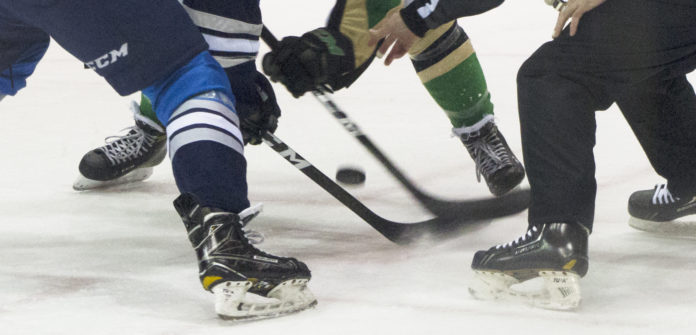Clarence Iron is a notoriously hard man to get ahold of.
Chalk it up to his work schedule, or the fact that he doesn’t have a cell phone, but while Iron’s voice is a familiar presence on the radio waves of Northern Saskatchewan, it’s a lot harder to catch him off of them.
“A lot of people want to talk today,” he chuckles shortly after finishing his daily shift on CFNK, where he’s responsible for two hours of Cree-language programming.
There’s a good reason Iron is so in demand. Later this month, he’ll be taking on play-by-play duties on March 24 when APTN and Rogers Sportsnet partner together for the inaugural Cree-language NHL broadcast. The importance of the moment isn’t lost on him.
Iron isn’t just a sports fan. He’s a huge proponent of teaching and speaking Cree, and he’s adamant this broadcast will “open doors for the next generation.”
“It’s slowly sinking in,” he says. “I’ve been thinking about it and I know it’s going to be a history maker. There’s an opportunity here.”
Like many Cree speakers, Iron learned the language from his grandparents, who taught it to him as a youth in Canoe Lake Cree Nation. Like most play-by-play men, he got his start in English, working Indigenous hockey tournaments from Prince Albert to Prince George and everywhere in between.
He started with MBC radio in 1993, and became known for sprinkling a few minutes of Cree play-by-play in with his regular English commentary. Fans responded well to those broadcasts, and the requests for a complete Cree hockey show grew louder and louder.
With more and more Cree language classes being taught in schools, Iron said it was only a matter of time before it became more popular outside of the classroom. It was just a matter of making people comfortable enough to speak it in everyday life, and he knew sports broadcasts could play a major role.
“A lot of the younger generation, they can speak it, but because of what happened in the past, a lot of people are kind of shy, talking in their language,” he says. “Even among their own people.”
Iron enjoyed calling sports events in Cree, and continued to work in hockey, as well as curling, boxing and the Tony Cote First Nations Winter Games. That’s where the opportunities were, he says, and although he would love to do more hockey at a higher level, he wasn’t sure that chance would ever come. Things started to change, however, after he watched a few nights of Hockey Night in Canada’s Punjabi broadcast.
“I thought to myself, ‘well, if these guys can call (a game) in their own language, we can do it too in Cree,’” he remembers. “That was way, way back and now it’s coming true.”
As a sports fan, Iron is excited to be a part of hockey history. He doesn’t even mind that his favourite team’s biggest rival will be part of the broadcast. Growing up, Iron loved watching Darryl Sittler’s Toronto Maple Leafs in the NHL, and the pre-Wayne Gretzky Edmonton Oilers in the WHA. When he sits down to call his first NHL game, it will be between the Carolina Hurricanes and Toronto’s arch-rival, the Montreal Canadians.
Iron says he’ll have no problem calling the contest in an unbiased manner, but the matchup is giving his friends a few good laughs.
“My buddies out here, they’re happy that I’m going to be calling a Montreal game because they’re Montreal fans,” he chuckles. “They were one of the Original Six, so there’s a lot of Montreal fans who are still out here.”
Iron is hopeful the broadcast will help spur Indigenous youth to not only learn their native languages, but also gain the confidence to keep using them. Ideally, he’d like to see APTN do a weekly Cree-language broadcast of NHL hockey, if the opportunity arises.
For the next few days, however Iron plans to put aside thoughts of the future and work on memorizing the names, stats and jersey numbers of every player who will take to the ice with the Habs and Hurricanes meet on March 24. He’ll also be thinking about the people who helped him get this opportunity in the first place.
“I usually put God number one,” he says. “That’s the one who gave me the gift to speak Cree, and also my grandparents. They’re the ones who raised me and taught me how to speak Cree. They’re gone now, but that’s where I learned my Cree. Right at home.”


